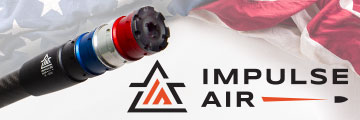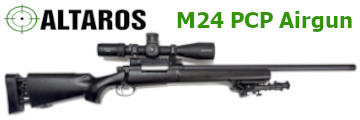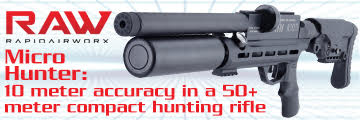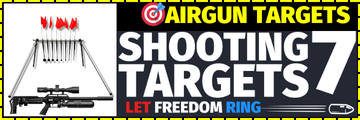Yes, you can silence a piston rifle.
- By OldSpook
- Barrels & Muzzle Devices
- 9 Replies
... AND it WILL be as quiet as your PCP!!!
A recent thread prompted me to run a test this morning. I was certain that moderators provided no real advantage on piston rifles. So much for what we "believe" and what we "know".
I pulled half a dozen moderators, couple of Donny's and some home brew, from my bench and picked up the HW98 in .20 cal. I also tested my HW110 against the springer so that we could compare apples to apples. The HW110 shows up on the graph below.
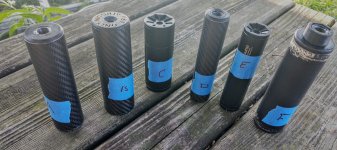
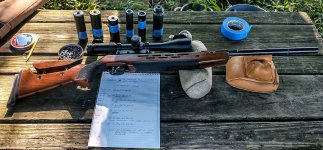
I carried them out to the bench and set my "sensor" six meters from the muzzle and a meter off the path of the pellet because I want to know how the moderator performs in the direction of the target. I am a hunter first.
I fired five shots each with the six moderators and five with the rifle in the stock configuration. Here are the results. Draw your own conclusions? Let me suggest that VENDORS pay close attention to these results because they may open up a significant new market (or not). I now wish every springer I own had a threaded muzzle.
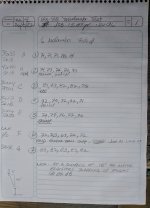
I ran that data on the spread sheet.
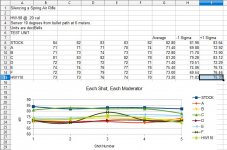
Yes Martha, I was surprised too.
What I believe is going on here is simple enough. Our hearing is non-linear. We perceive loud sounds with less sensitivity than quiet sounds. When we put a pound or two of metal and plastic right next to our heads and release all that energy it literally overwhelms our ability to hear anything else for a moment. During that moment the muzzle blast occurs and we mostly can't hear it. It makes it darn near impossible to judge for ourselves if the moderator is doing anything to reduce sound down range. To my ear there was basically no difference other than perhaps the "tone" or "sharpness" of the sound, but down range, there is a difference.
Test it for yourself.
NOTE # 1: Tom, B is CF#1, A and D are identical internally to CF#1 but vary in diameter and so volume.
NOTE # 2: -11 dB is a huge change in sound power. Specifically it is like reducing the power by about 1,250 PERCENT or 12 and a half times.
A recent thread prompted me to run a test this morning. I was certain that moderators provided no real advantage on piston rifles. So much for what we "believe" and what we "know".
I pulled half a dozen moderators, couple of Donny's and some home brew, from my bench and picked up the HW98 in .20 cal. I also tested my HW110 against the springer so that we could compare apples to apples. The HW110 shows up on the graph below.


I carried them out to the bench and set my "sensor" six meters from the muzzle and a meter off the path of the pellet because I want to know how the moderator performs in the direction of the target. I am a hunter first.
I fired five shots each with the six moderators and five with the rifle in the stock configuration. Here are the results. Draw your own conclusions? Let me suggest that VENDORS pay close attention to these results because they may open up a significant new market (or not). I now wish every springer I own had a threaded muzzle.

I ran that data on the spread sheet.

Yes Martha, I was surprised too.
What I believe is going on here is simple enough. Our hearing is non-linear. We perceive loud sounds with less sensitivity than quiet sounds. When we put a pound or two of metal and plastic right next to our heads and release all that energy it literally overwhelms our ability to hear anything else for a moment. During that moment the muzzle blast occurs and we mostly can't hear it. It makes it darn near impossible to judge for ourselves if the moderator is doing anything to reduce sound down range. To my ear there was basically no difference other than perhaps the "tone" or "sharpness" of the sound, but down range, there is a difference.
Test it for yourself.
NOTE # 1: Tom, B is CF#1, A and D are identical internally to CF#1 but vary in diameter and so volume.
NOTE # 2: -11 dB is a huge change in sound power. Specifically it is like reducing the power by about 1,250 PERCENT or 12 and a half times.
























